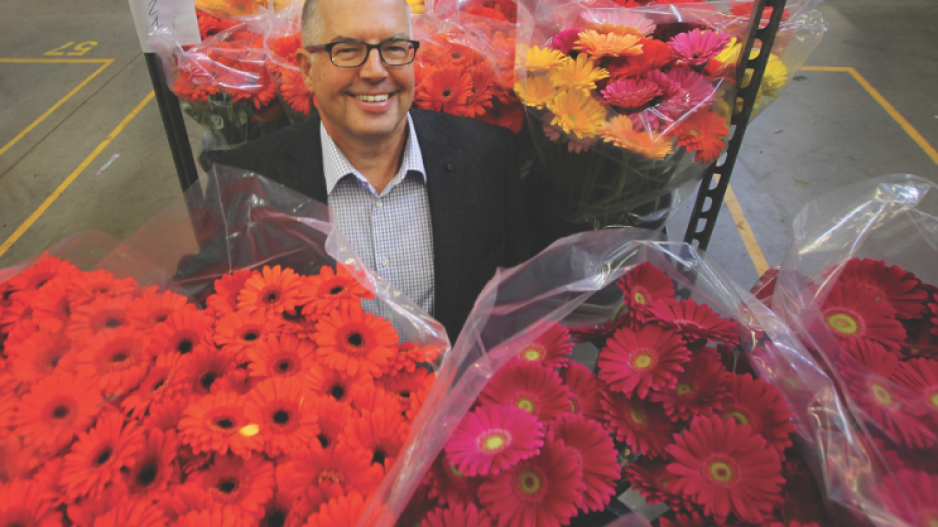The late summer sun is glinting off the Fraser River and the industrial buildings of south Burnaby. It’s a warm morning, with just the faintest hint of autumn as buyers bid on the fragrant lots coming forward at the largest Dutch-style flower auction on the continent.
Wholesalers and retailers place bids on more than 20,000 buckets of flowers that are either grown in the Fraser Valley by members of United Flower Growers Co-operative Association, which runs the auction, or imported from South America. Wholesalers and retailers name their price as the values wind down on lots in rapid succession. Bidding starts high for the flowers, a perishable commodity that operates in a buyer’s market; premium blooms fetch a high price, but buyers can also wait till prices drop to meet their budgets.
But the auction business isn’t what it used to be.
Rather than buy off the spot market for whatever product is available, retailers increasingly contract in advance. Predictable supplies at defined prices suit the low-margin business of retailing, with its high capital costs and fickle consumers.
Securing that same certainty for local flower growers was the challenge Bob Pringle faced when he joined United Flower Growers as CEO in 2004, after 23 years in commercial banking with CIBC.
Created in 1963, the co-op needed to reinvent itself. While the auction business still served small growers, retailers were looking more to wholesalers to serve their needs. Some big growers were able to fill retailers’ orders themselves, while smaller growers benefited from the centralized sales desk the co-op offered.
“It had a co-operative function, but it had started, because of necessity, to create for-profit businesses to supplement and support the infrastructure that we had,” Pringle explained. “Those things started to increase, whereas the co-op had declined.”
Auction revenues declined from $45 million in 2001 to about $28 million today, while revenues from other activities rose to about $10 million.
Meanwhile, the co-op was sitting on a 12.6-acre site ideally located to be a hub for Metro Vancouver’s flower growers. Its value had increased significantly since its acquisition in 1977, but the appreciation accrued to the co-op rather than members; retiring members wouldn’t benefit from the key asset of the business they helped to build.
Transforming the co-op to present realities while giving members a stake in the asset that underpinned its operations was Pringle’s challenge, and one familiar to many producer co-ops.
“There’s often a moment of truth with agricultural co-ops,” Pringle said. “Many times things happen and co-ops dissolve, go bankrupt or convert to corporations.”
Co-ops such as Dairyland (acquired by Saputo Inc. in 2000), B.C. Hot House Foods Inc. (which shrank dramatically following the loss of its marketing monopoly in 2001), and Abbotsford Growers (reconstituted as a for-profit business last year after financial troubles) are all examples.
Pringle had become familiar with United Flower Growers during his career at CIBC, but guiding the co-op into the future was a complex endeavour.
“I had worked with this company through good times and bad as a banker,” he said. “We have never had financial difficulties, but there were things happening in the industry and the business needed significant change. I did not know how significant that was when I got involved.”
Tapping his background in corporate finance, and the advice of accounting firm KPMG and lawyers Farris Vaughan Wills & Murphy LLP, Pringle identified the co-op’s real estate holdings as fundamental to both its long-standing auction and its emerging for-profit business opportunities.
Through five years of discussions with its 82 members, the co-op devised a structure that gives growers a controlling stake in the property while allowing non-growers to gradually take an equity stake in the business. Co-op members voted 82% in favour of a plan that promises to support the future development of the flower business.
“There wasn’t a simple way to do this in the co-op act,” Pringle explained. “We used a corporate plan of arrangement … [and] created a structure that we hope lasts for decades to come, where [this property] has a business function, it has a return for those shareholders, but it’s controlled and designed to stay in the floral business.”
He proudly shows off the six thick binders of legal documentation that culminated with the formation of United Floral Holdings Inc. on September 30, 2015.
A few weeks later, the company acquired Kirby Floral Inc., a move that boosted its wholesale business from $10 million to $22 million. United Floral now records about $60 million in annual revenues, about half of which comes from the co-op’s auction sales.
The transformation means that Pringle, now 60, can spend more time with his wife, their three kids and his skis.
“This has been a very time-consuming few years for me,” he said. “I used to be a very avid skier, and I’m actually getting back into that.”
Raised in Prince Albert, Saskatchewan, Pringle studied agricultural economics at the University of British Columbia before joining CIBC in 1980 just as interest rates began heading skyward. He was in the bank’s special loans division at the time and saw first-hand how quickly things can go sideways.
Other experiences, such as serving as an independent director with the Madison Group and chairing the finance committee of BC Children’s Hospital Foundation, gave him further insights into how to build consensus and create value.
“I’ve seen a lot of these complicated situations where a lot of people have to come together to find the right outcome,” he said, noting that flower growers should receive the first dividend cheques from the renewed co-op in early 2017.
“We hope to start paying dividends to our members next year,” he said.




